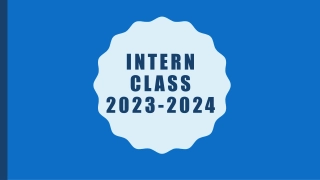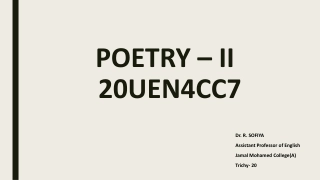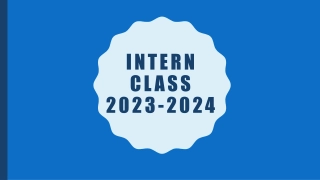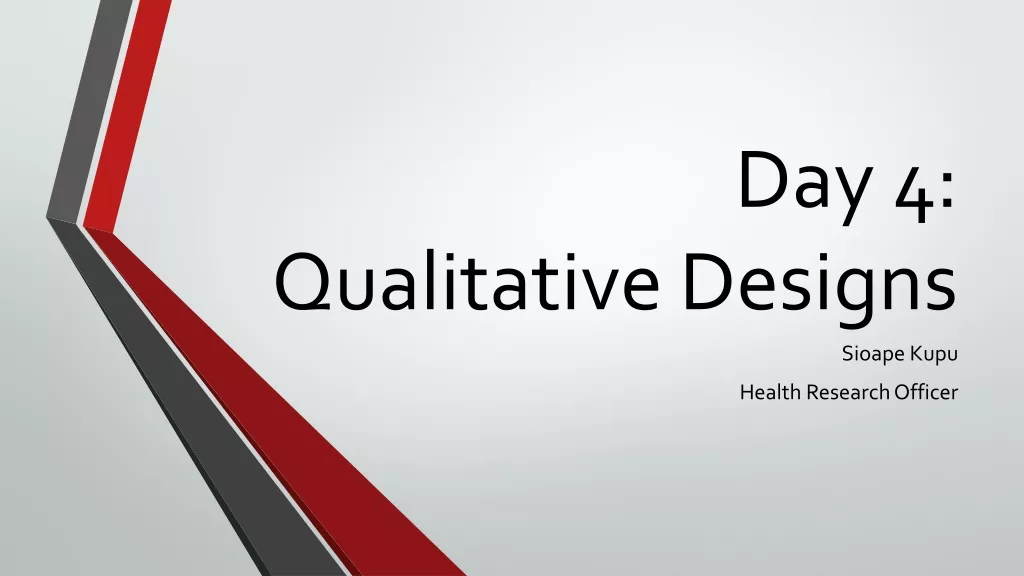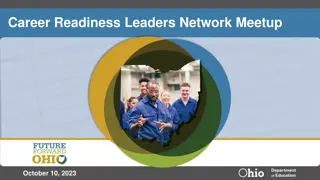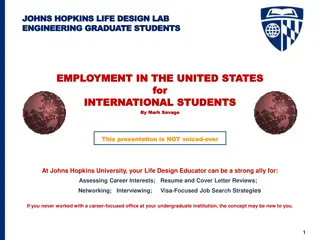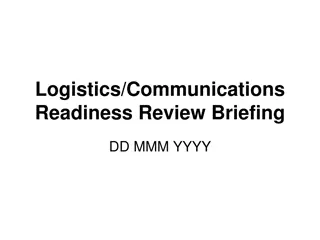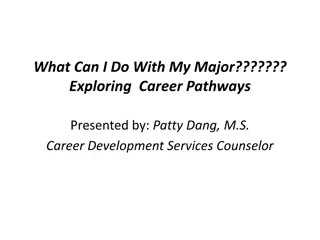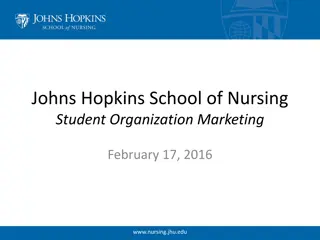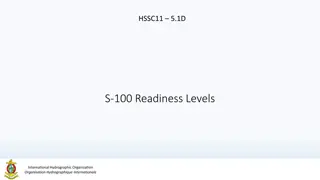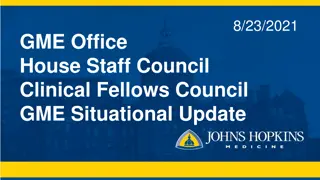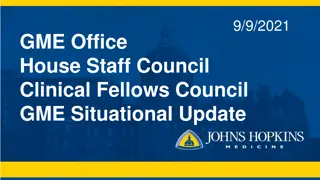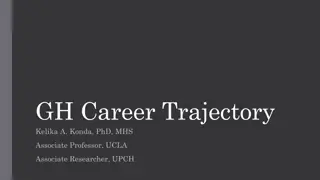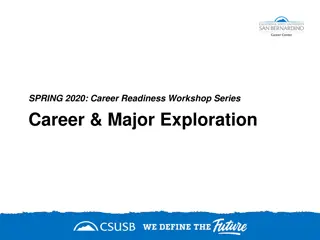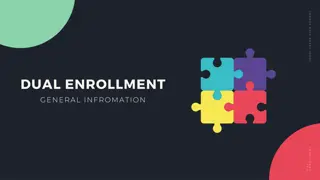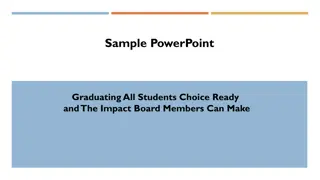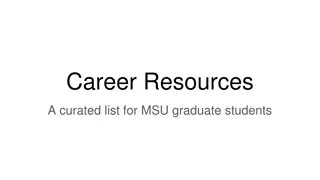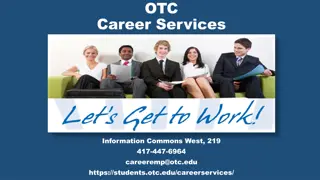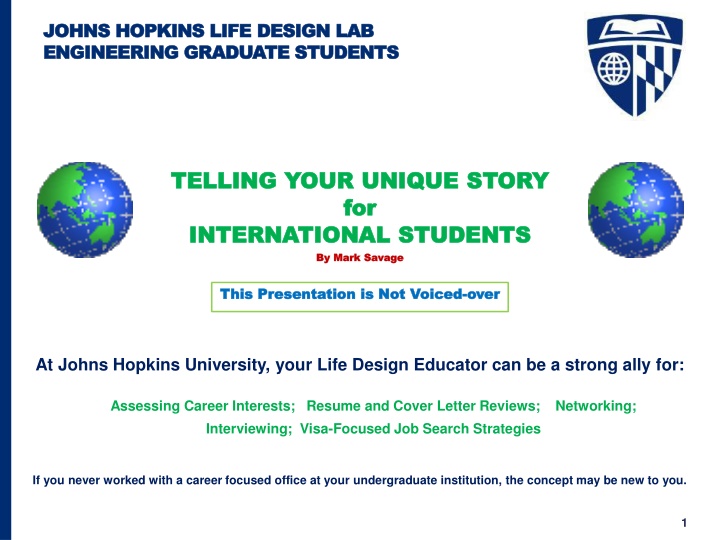
Enhancing Career Readiness for International Students at Johns Hopkins Life Design Lab
Providing career support for international students at Johns Hopkins University through assessing interests, resume reviews, networking, and visa-focused job search strategies. The Life Design Lab aims to bridge the gap between employer expectations and student preparation, offering lasting career readiness skills and alumni engagement opportunities.
Uploaded on | 1 Views
Download Presentation

Please find below an Image/Link to download the presentation.
The content on the website is provided AS IS for your information and personal use only. It may not be sold, licensed, or shared on other websites without obtaining consent from the author. If you encounter any issues during the download, it is possible that the publisher has removed the file from their server.
You are allowed to download the files provided on this website for personal or commercial use, subject to the condition that they are used lawfully. All files are the property of their respective owners.
The content on the website is provided AS IS for your information and personal use only. It may not be sold, licensed, or shared on other websites without obtaining consent from the author.
E N D
Presentation Transcript
JOHNS HOPKINS LIFE DESIGN LAB JOHNS HOPKINS LIFE DESIGN LAB ENGINEERING GRADUATE STUDENTS ENGINEERING GRADUATE STUDENTS TELLING YOUR UNIQUE STORY TELLING YOUR UNIQUE STORY for for INTERNATIONAL STUDENTS INTERNATIONAL STUDENTS By Mark Savage By Mark Savage This Presentation is Not Voiced This Presentation is Not Voiced- -over over At Johns Hopkins University, your Life Design Educator can be a strong ally for: Assessing Career Interests; Resume and Cover Letter Reviews; Networking; Interviewing; Visa-Focused Job Search Strategies If you never worked with a career focused office at your undergraduate institution, the concept may be new to you. 1
WELCOME TO JOHNS HOPKINS AND THE LIFE DESIGN LAB Our Mission: Provide all students and alumni the experiences, knowledge, skills and tools to make smart career decisions and to package and prepare themselves for their pursuits. Close the gap between what employers seek in graduates and what students / alumni are equipped with. Orchestrate university-wide connections to build the best possible career ready network. Build enduring career readiness capabilities those that last beyond first destinations. Be a catalyst for alumni engagement lifetime affiliation. 2
Terms Used in This Presentation (1 of 2) Behavioral Interview: A job interview comprised of questions based on a person s past performance in handling a specific situation or scenario, typically asked in the form of: Tell me about a time when you The answer must depict an event that the interviewee handled at a specific point in time. (See STAR METHOD) Bi-Cultural: The ability to view, understand and accept events, practices and protocols through the perspectives of one s original culture and a second culture in which one has been immersed. How one thinks, acts, believes, and interacts, based on the society in which one was raised. Culture: Fit: The ability for an individual to effectively connect and work with a team through knowledge, experience, likability and sharing of common work-related values, traits, behaviors and attitudes. See Permanent Resident: Green Card Holders may plan to eventually attain US citizenship. Green Card: H1-B Visa: An employer-sponsored elective work visa for an international college graduate after OPT has ended, with a maximum term of 6 years. A person who is interviewed and evaluated for their ability and interest to perform an available work position within an organization. Interviewee: Interviewer: A person or group, often in authority, who conducts a job interview to determine someone s qualifications and suitability for a specific job opening within an organization. The extent by which people may take interest in and enjoy the company of another person. Likability: An online social media site that facilitates individuals to connect, maintain contact, and share photographs or articles of interest with people they know or have something in common. LinkedIn:
Terms Used in This Presentation (2 of 2) Lottery: A US Government random process that allocates employer-sponsored requests for H1-B Sponsorship among OPT holders. 85,000 H1-B visas are awarded annually, with 65,000 granted to undergraduate and graduate degree holders and an additional 20,000 awarded only to Masters and PhD graduates. Because STEM graduates can extend OPT status for up to 3 years, they may have up to 3 chances to be selected for H1-B status (once each year) while working on OPT status. A Johns Hopkins Mentoring Program for students to connect with alumni for career advice. ONE HOP OPT (Optional Practical Training): International Services (OIS) in the last months before graduation. Generally valid for 1year, it is valid for up to 3 years for STEM major graduates. The work must relate to the graduate s field of study. The first temporary US work visa status, applied for by international students through the Office of Permanent Resident / Green Card: Work Visa Status secured by an employer sponsor prior to expiration of the H1-B Visa; Permanent Residents are issued a Green Card; many eventually seek to become US Citizens. It can cost over $10,000 for an employer working through an immigration attorney; the employer may also need to document an inability to find a suitable US citizen for the work. Plan A, Plan B, Plan C, etc.: Alternative plans, in this case, applied to employment possibilities to increase opportunities to remain in or to eventually return to the United States for work. Networking: The practice of connecting with other people with whom one has something in common or a shared interest, often accomplished through third-party referrals, direct outreach, or social media sites such as LinkedIn, One Hop, etc. Passion: Extreme pleasure or liking for an activity, an item, a place, a belief, or a practice. STAR Method: A method for answering Behavioral Interview questions (see above) based on a specific experience or scenario in which the interviewee describes a SITUATION faced, the TASK needed to resolve the situation, ACTIONS taken to resolve the situation, and the end RESULT. STEM: Science, Technology, Engineering, Mathematics as applied to a field of study or work setting.
JOHNS HOPKINS LIFE DESIGN LAB JOHNS HOPKINS LIFE DESIGN LAB ENGINEERING GRADUATE STUDENTS ENGINEERING GRADUATE STUDENTS You may feel uncertain or overwhelmed when starting your US-based job search. The process ramps up quickly in September, so you must prepare early. Your Life Design Educator is aware of these challenges and will help to prepare you. Try to overcome cultural barriers that may impede sharing your career goals and job search issues. Who are you? Why did you come to study in the US? How has your culture influenced you? What strengths & weaknesses do you bring to your graduate study? 5
THE IMPACT OF YOUR CULTURE Your culture has developed your values, your family roles, and your relationships in all areas of your life. Career choices may be influenced by your home country s culture, your experience in the US, or both. Discord between US culture and your country s culture may lead you to feel conflicted. 6
THE IMPACT OF CULTURE It may be different for Americans: US culture focuses on conditioning and encouragement to pursue experiential opportunities from an early age. Their culture stresses self development and promotion. Why are you who you are? Think about your strengths and your weaknesses Where you fit and where you don t fit What kind of life you want What kind of career you want Obtain feedback from your peers. 7
Join clubs & interest groups, volunteer, and connect with people of various ages and social / economic backgrounds on campus and in the Baltimore community. Be genuine, listen, respect people s time, and and don t worry about your accent. People want to engage in real conversation; If they like you, they may offer to help you! Also network with other international students. Use social networking such as LinkedIn to find alumni and others who can offer advice or who may work in fields or for employers who may be of potential interest to you. 8
In a job interview, do discuss your current US education and experience, but also talk about your home country experience. Focus on your accomplishments, what you learned, and how you succeeded. If you have no work experience, talk about your research or a school / volunteer project. Relate your skills, past experiences and motivations to the job you re discussing while convincingly expressing strong interest. Impactful storytelling will help your interviewer know what you re all about 9
SHARING YOUR STORY You have shown the fortitude, intellect, and adaptability to pursue a graduate degree in a foreign country, so you ve already validated much about your capability as an employee. But, Americans also look for clarity: Provide specific examples that support your claims, using hard numbers. To provide a point of reference, You might cite how your former employer is a leading provider of [product] or [service], or an employer of choice for people in your country. 10
SHARING YOUR STORY In your story, incorporate value for the organization you wish to join. My Contribution in that research or team project was .. What was YOUR individual contribution? What problem did YOU solve? If you are from a culture where individual accomplishments are almost always described as part of a group effort, this may take some practice. 11
JHU H COMMUNICATE Focus on the quality of your ideas: Don t be too soft-spoken and don t stress over how you sound. Read newspapers and watch TV to learn about language, culture and humor. Work on writing skills and tone: Watch for wordiness and grammar / spelling mistakes. Engage in campus life: Find Americans who have interest in your country to help improve your English. 12
COMMUNICATE Think before you speak; practice speaking slowly if you have a strong accent, especially on the telephone. Practice Informality: Some international students may be used to a more formal structure of English. Most US scenarios may not call for such extreme formality. Extreme Formality is No Longer Extreme Formality is No Longer Part of the American Culture Part of the American Culture 13
Bilingual is not Bicultural: Bicultural people can see the world and their experiences through the lenses both of their own culture and that of their host country. They are often able to evaluate issues with new perspectives that may be less prevalent in candidates who have no exposure to life outside their own country. Show interviewers how your original ideas can help grow their business! Straddle two cultures to help organizations advance in the marketplace 14
RELATE STORY in INTERVIEW HIRED PREPARE STORY Every employer seeks candidates who offer technical skills, creative problem solving, communication skills, and an ability to make sense of dissimilar data sets. This combination may not be easily replicated by your competition, but you may need strong marketing and storytelling skills to help recruiters realize and appreciate your unique views and talents. 15
Engage your multi-cultural perspectives to describe what is unique about you; emphasize your global mobility, language skills, knowledge of your home region, and technical or quantitative expertise. Multicultural Multicultural Studies Studies and and Experience Experience Focus on both your experience and your studies to display unique and interesting career insights and interests. 16
GET STARTED ON YOUR CAREER JOURNEY WE RE HERE TO HELP FOR ANY CAREER OR JOB SEARCH ISSUE! BEFORE STARTING YOUR PROGRAM: Mark Savage, Life Design Educator Engineering Masters Students (Homewood & EP) Except Those Noted Below msavag16@jhu.edu 1. Set up an account on Handshake (JHU s Recruitment Management System) https://handshake.jhu.edu use your JHED-ID & Password 2. Set up an account on LinkedIn if needed Sonjala Williams, Life Design Educator Homewood Engineering Masters Students in Applied Math, Data Science, Financial Math and Statistics Sonjala@jhu.edu 3. Draft a US-formatted Resume (Online Course) AFTER STARTING YOUR PROGRAM: 1. Have your resume critiqued 2. Draft a Cover Letter and Have it Critiqued Roshni Rao Director of Phutures PhD & Post-Docs rrao12@jhu.edu 3. Perfect your Resume and Cover Letter 4. Prepare for Campus Career Fairs & Apply for Job 5. Touch Base With Your Career Mentor as Needed 17

